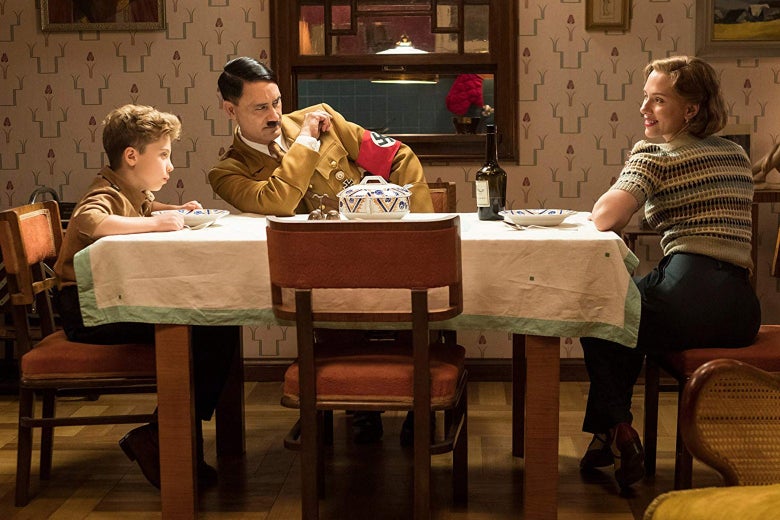Jojo Rabbit isn’t the only movie at the Toronto International Film Festival to include footage of the Nuremberg rallies. A Hidden Life, Terrence Malick’s contemplative profile of Austrian conscientious objector Franz Jägerstätter, includes several clips from the infamous Nazi propaganda documentary Triumph of the Will. But it is the only one, at least so far as I know, to pair footage of Adolf Hitler’s rise with the Beatles’ “I Want to Hold Your Hand,” with the lyrics translated into German. As crowds line the streets, straining for a glimpse of the Führer, you can’t but feel the song’s pull, the ecstatic rush of its desire for connection, even as you’re watching a country succumb to an insidious ideology rather than be bound together by the transportive power of pop music. It’s the new sensation that’s sweeping the nation: Hitlermania.
Nervously presented by its marketing materials as an “anti-hate satire,” Jojo Rabbit focuses on the adorable, uber-Aryan Jojo Betzler (Roman Griffin Davis), a 10-year-old who’s being prepped to fight for the Fatherland in the waning days of World War II. His father, an accused deserter, is absent from both his life and the German army, and the men who remain in his city are a collection of screw-ups and rejects not fit for the front, so Jojo invents an imaginary friend to serve as a male role model—and that imaginary friend is Hitler himself. Jojo’s Hitler, however, doesn’t quite match up with the real deal. For one thing, he’s more concerned with helping a young boy overcome his insecurities than he is with the triumph of the master race. And for another, he’s played by writer-director Taika Waititi, the New Zealand–born child of a Jewish mother and a Maori father, a gesture that one can only hope will prove mortally offensive to any white supremacists who might attempt to co-opt the film for their own purposes.
Waititi plays Hitler—who, in the Q&A following the film’s world premiere, he referred to only as “the friend”—like an anti-Semitic Jiminy Cricket, dispensing pearls of wisdom and periodic racial slurs. It’s a tricky balancing act, and one it’s fair to ask why he undertook in the first place, especially given that the book from which the movie is adapted, Christine Leunens’ Caging Skies, contains no such figure. (At the premiere, Waititi joked that his adaptation was based on his mother’s inaccurate summary of the novel’s plot.) There will be plenty of people who object to the movie on concept alone. Some of the early reviews disparagingly likening it to Life Is Beautiful read as if they were half-written, or at least conceived, before the movie had even screened. But Waititi isn’t a glib provocateur, and in his remarks after the premiere, he made the seriousness of his intentions clear, likening the present moment to 1933, when the world’s “ignorance and arrogance” prevented it from reckoning with an existential threat as it emerged.
Although you wouldn’t know it from the movie’s advance materials, the heart of Jojo Rabbit is not Jojo’s relationship with Hitler, real or imaginary, but with Elsa (Thomasin McKenzie), the Jewish girl he finds living in a hidden room in his family’s apartment. Although she keeps it quiet in front of her son, his mother, Rosie (Scarlett Johansson), is clearly opposed to the Reich and troubled by what her son has become. (When she wonders aloud what happened to the sweet boy she knows is still in there, she sounds like the parents of a contemporary alt-right activist.) Elsa is canny enough to turn the stories Jojo has internalized about Jews’ demonic powers to her advantage, intimidating him into keeping quiet while also relying on him for human contact, especially during the long periods Jojo’s mother is absent from the house. Despite his desire to please his imaginary Führer, Jojo is actually not a very good Nazi, lacking the viciousness even to kill a bunny, which provides the origin of his derisive nickname. He convinces himself he’s pumping Elsa for information, gathering Jewish secrets to share with his superiors, but what he’s really doing is compiling fairy tales, replacing his absent (and probably dead) sister just as he did his father.
The movie’s humor is deliberately broad, almost vaudevillian at times. The words “a Jew!” are followed by “God bless you,” and when one Nazi is ordered to round up a pack of German shepherds, he returns with a bunch of men in lambswool vests. Jojo’s friendship with another misfit Hitler Youth reject, a plump child with thick, round-framed glasses, has the stylized quality of a Wes Anderson movie, except that instead of being an ersatz Boy Scout, Jojo’s being instructed by a smirking Nazi captain (Sam Rockwell) on how to throw hand grenades. But Waititi isn’t making light of Nazis; he’s mocking them, denying them and their present-day analogues the dignity of taking them—as distinct from the very real threat they pose—seriously. (Onstage, he referred to the real Hitler as “this buffoon.”) For Jojo Rabbit, comedy isn’t a means to minimize but to analyze, to pry at the way hateful ideologies can be embraced as a comfort, and how beneath their promise to explain how the world really works is an understanding no more sophisticated than a child’s. It’s not a difficult movie to watch, but it’s a hard one to think about, and even harder just to sit with.
